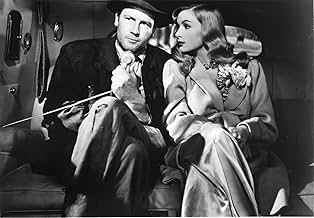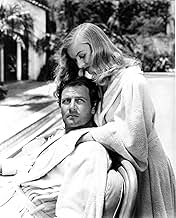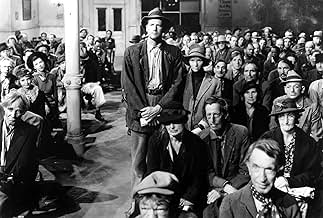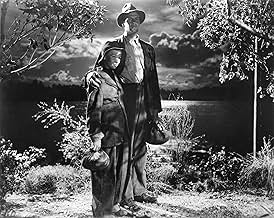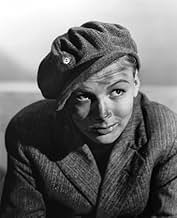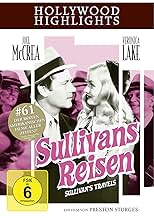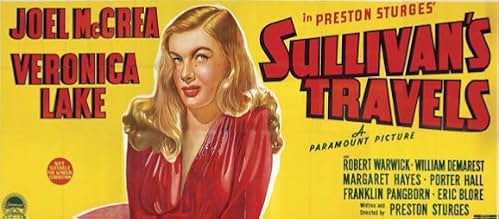IMDb RATING
7.9/10
30K
YOUR RATING
Hollywood director John L. Sullivan sets out to experience life as a homeless person in order to gain relevant life experience for his next movie.Hollywood director John L. Sullivan sets out to experience life as a homeless person in order to gain relevant life experience for his next movie.Hollywood director John L. Sullivan sets out to experience life as a homeless person in order to gain relevant life experience for his next movie.
- Awards
- 2 wins total
Charles R. Moore
- Colored Chef
- (as Charles Moore)
- Director
- Writer
- All cast & crew
- Production, box office & more at IMDbPro
Featured reviews
After the opening credits, the film opens with the following statement.
"To the memory of those who made us laugh: the motley mountebanks, the clowns, the buffoons, in all times and in all nations whose efforts have lightened our burden a little, this picture is affectionately dedicated."
With this film, Preston Sturges made one of the smartest and most insightful comedies ever to come out of Hollywood, in which he especially held up the mirror to Tinseltown itself. A Hollywood variation on Gulliver's Travels, it's the tale of Hollywood director John Sullivan (Joel McCrea), tired of making Hollywood Fluff, who wants to branch out with a socially conscious epic, called "O Brother, Where Art Thou", and sets out to research the meaning of poverty. His studio bosses (very funny roles by Robert Warwick and Porter Hall) try to tell him it's a ridiculous idea but Sullivan insists, puts on some hobo clothes and sets out to see what it's like to experience poverty and suffering. The studio soon sees it as potential publicity stunt and sent an entire crew to follow him around during his trip.
Some very enjoyable references to socially conscious movie-making, to Ernst Lubitch in particular, make this particularly fun with some knowledge of the period and the films mentioned, albeit not necessary. And almost worth seeing alone for Veronica Lake's memorable performance as a failed starlet.
According to Sturges, the film did contain a little "message":
"SULLIVAN'S TRAVELS is the result of an urge, an urge to tell some of my fellow filmwrights that they were getting a little too deep-dish and to leave the preaching to the preachers."
By any means, he made a uniquely self-reflective comedy about Hollywood with wonderful characterizations and superlative performances. A brilliant satire with a "message" just as poignant as ever.
Camera Obscura --- 9/10
"To the memory of those who made us laugh: the motley mountebanks, the clowns, the buffoons, in all times and in all nations whose efforts have lightened our burden a little, this picture is affectionately dedicated."
With this film, Preston Sturges made one of the smartest and most insightful comedies ever to come out of Hollywood, in which he especially held up the mirror to Tinseltown itself. A Hollywood variation on Gulliver's Travels, it's the tale of Hollywood director John Sullivan (Joel McCrea), tired of making Hollywood Fluff, who wants to branch out with a socially conscious epic, called "O Brother, Where Art Thou", and sets out to research the meaning of poverty. His studio bosses (very funny roles by Robert Warwick and Porter Hall) try to tell him it's a ridiculous idea but Sullivan insists, puts on some hobo clothes and sets out to see what it's like to experience poverty and suffering. The studio soon sees it as potential publicity stunt and sent an entire crew to follow him around during his trip.
Some very enjoyable references to socially conscious movie-making, to Ernst Lubitch in particular, make this particularly fun with some knowledge of the period and the films mentioned, albeit not necessary. And almost worth seeing alone for Veronica Lake's memorable performance as a failed starlet.
According to Sturges, the film did contain a little "message":
"SULLIVAN'S TRAVELS is the result of an urge, an urge to tell some of my fellow filmwrights that they were getting a little too deep-dish and to leave the preaching to the preachers."
By any means, he made a uniquely self-reflective comedy about Hollywood with wonderful characterizations and superlative performances. A brilliant satire with a "message" just as poignant as ever.
Camera Obscura --- 9/10
No need to add to the praise others have justly given this classic, but there's one thing I think is especially clever about the plot (without giving too much of it away). The apparent moral of this Depression-era movie is that bad as conditions may be, audiences don't need to be reminded about them, instead needing escapist fare to distract them from the world's problems. Meanwhile, after setting you up to relax and enjoy a screwball comedy, Sturges succeeds in surreptitiously drawing you into just the kind of bleak "social consciousness" movie his characters are saying is impossible to get people to watch, without your realizing it at the time. Well, without my realizing it, anyway, until much later.
In Hollywood, the spoiled director of humdrum movies, John Lloyd Sullivan (Joel McCrea), was born in silver spoon but is very successful with his superficial comedies. Out of the blue, he tells to his producer Mr. LeBrand (Robert Warwick) that he wants to make serious dramas, like "O Brother, Where Art Thou?" and he will live like a tramp on the streets to learn the sorrows of great part of the population. He wears cheap clothes and tries to blend with poor people but he always returns to Hollywood protected by the safety team hired by the studio.
One day, he goes to a dinner with a coin and a blonde girl (Veronica Lake) offers bacon and eggs to him. Soon he learns that the girl is a failed actress that had never a chance in Hollywood and is returning home hitchhiking without any money. Sullivan decides to retribute her kindness giving a ride to her in his car but they are arrested by the police. When they are released, the girl decides to join Sullivan in his quest to learn about poverty. When Sullivan is satisfied, he is robbed and dumped unconscious in a train. He awakes in the countryside where there is an incident and he is arrested and sentenced to a labor camp, where he leans the importance of comedy in the miserable lives of destitute people.
"Sullivan's Travels" is a delightful movie by Preston Sturges with a satire of Hollywood lifestyle and the importance of comedy in the life of people, a relief for a couple of minutes for those that do not have other sort of entertainment. Joel McCrea is very funny in the role of a naive director trying to find how the poor people live. His chemistry with the gorgeous Veronika Lake is perfect and this was the first time that I noted that this lovely actress was only 1.51 m height. My vote is eight.
Title (Brazil): "Contrastes Humanos" ("Human Contrasts")
One day, he goes to a dinner with a coin and a blonde girl (Veronica Lake) offers bacon and eggs to him. Soon he learns that the girl is a failed actress that had never a chance in Hollywood and is returning home hitchhiking without any money. Sullivan decides to retribute her kindness giving a ride to her in his car but they are arrested by the police. When they are released, the girl decides to join Sullivan in his quest to learn about poverty. When Sullivan is satisfied, he is robbed and dumped unconscious in a train. He awakes in the countryside where there is an incident and he is arrested and sentenced to a labor camp, where he leans the importance of comedy in the miserable lives of destitute people.
"Sullivan's Travels" is a delightful movie by Preston Sturges with a satire of Hollywood lifestyle and the importance of comedy in the life of people, a relief for a couple of minutes for those that do not have other sort of entertainment. Joel McCrea is very funny in the role of a naive director trying to find how the poor people live. His chemistry with the gorgeous Veronika Lake is perfect and this was the first time that I noted that this lovely actress was only 1.51 m height. My vote is eight.
Title (Brazil): "Contrastes Humanos" ("Human Contrasts")
Having read some of the negative views on this film, I think it's necessary to take the long view. Anybody can have an opinion, but when people like Steven Spielberg, George Lucas, Sydney Pollack, Leonard Maltin and Roger Ebert place this film in their best 20 list, there must be a reason. First, Preston Sturgis, a genius, they even named a building after him on the Paramount Studio Lot. Seven big hit films in seven years, plus he had a giant reputation as a Broadway playwright. Although some may disagree, I think this film was his masterpiece. The scene in the poor black church, where the convicts go in shackles is so brilliant, it ranks with some of the best filmmaking on the planet. I've heard people say it was stereotypical, yet unfortunately, that's the way it was then. The juxtaposition of the convicts, who had lost their civil rights, and the poor African Americans who never had civil rights, mated to the song, "Let My People Go", puts this film heads and shoulders against anything anybody was doing in 1942.
Joel McCrea gives the performance of his career. I fell totally in love with Veronica Lake; who wouldn't? The first scene lasts five minutes without a cut. To the MTV generation this is mortal sin, but Sturgis, having come from the theater, lets his actors, act. When I was a film student, I learned more from this film, than any other of which I can think at the moment. It is a classic's classic. If you choose not to watch it, then you're missing something that formed the directing habits of the best directors of our era. In other words, you are the loser.
10/10
Joel McCrea gives the performance of his career. I fell totally in love with Veronica Lake; who wouldn't? The first scene lasts five minutes without a cut. To the MTV generation this is mortal sin, but Sturgis, having come from the theater, lets his actors, act. When I was a film student, I learned more from this film, than any other of which I can think at the moment. It is a classic's classic. If you choose not to watch it, then you're missing something that formed the directing habits of the best directors of our era. In other words, you are the loser.
10/10
As original a piece from the 1940s as you'll likely come across and one where it could quite easily have found itself as knotted and gnarled as some of the boots seen pounding the highways and byways of its cast. Fortunately those pretentious rips fail to appear and it's the arrival of Veronica Lake that turns the ramble to a journey and an illustration as relevant today about the lack of opportunity we continually chose to turn a blind eye to. An interesting twist towards the end provides something to chew on and supports a finale that may well give you a little to smile about, maybe even a chuckle.
Did you know
- TriviaCinematographer John Seitz admired Preston Sturges' unconventional approach to his work. The opening scene comprised ten pages of dialogue to cover about four and a half minutes of screen time. It was scheduled for two complete days of shooting. On the morning of the first day, Seitz found Sturges inspecting the set with a viewfinder, looking for where he could cut the scene and change camera set-ups. Seitz dared him to do it all in one take. Never one to refuse a dare, Sturges took him up on it, although the nervous Seitz had never attempted to complete a two-day work schedule in one day. With the endorsement of McCrea and the rest of the actors, Sturges pressed on, determined to set a record. The first take was fine, but the camera wobbled a little in the tracking shot following the men from screening room to office, so they tried again. They did two or three takes at the most and that was it - two full days work by 11 a.m. on the first day, a feat that had the entire studio buzzing.
- GoofsWhen Sullivan and the Girl jump off the train and walk to the lunch stand, nothing is visible around the outside of the lunch stand--not a car, tree or anything. When Sullivan asks if the proprietor had seen a land yacht (a big RV), the proprietor points to the side and they look out the window and see the big land yacht parked there. Of course, if it had been there in the first place, Sullivan would have seen it right away and not gone into the lunch stand.
- Quotes
[last lines]
John L. Sullivan: There's a lot to be said for making people laugh. Did you know that that's all some people have? It isn't much, but it's better than nothing in this cockeyed caravan.
- Crazy creditsThe Paramount logo appears as a seal on a package.
The package is opened to reveal a book with the film title on it and the opening credits appear on pages in the book.
- ConnectionsFeatured in The Cinematographer (1951)
- SoundtracksSpring Song
(1844) (uncredited)
Written by Felix Mendelssohn
Played as part of the score when Sullivan starts his experiment
Reprised when he starts a second time
Details
Box office
- Budget
- $689,665 (estimated)
- Gross worldwide
- $10,390
- Runtime1 hour 30 minutes
- Color
- Aspect ratio
- 1.37 : 1
Contribute to this page
Suggest an edit or add missing content


